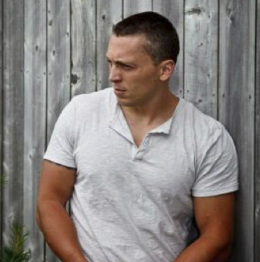RUSTY TALK WITH MATT LENNOX Matt Lennox Matt LennoxPhoto by John Brisbane Born in Orillia, Ontario, MATT LENNOX first pursued a military career, becoming a captain in the Canadian army, where he was posted to Afghanistan between 2008 and 2009. He wrote many of the stories in his first collection,Men of Salt, Men of Earth, there. It was published in 2009 and was shortlisted for the 2010 ReLit Award (the title story had been previously published in Best Canadian Stories in 2006). Alex Carey: What’s your first memory of being creative? Matt Lennox: I don’t really know. I guess being creative—however you might define that—has been a steady-state as long as I can remember, so I can’t imagine a time when I wasn’t. There was never a lightbulb moment or anything like that. I was always a bit of a dreamer. I didn’t do well on the peewee tee-ball team because I was more interested in the different shapes the clouds resembled. AC: You originally studied film, but you’ve since published a short story collection, Men of Salt, Men of Earth (Oberon Press, 2009) and a novel, The Carpenter (HarperCollins, 2011) What necessitated the switch the prose? ML: I guess filmmaking necessitated too much teamwork for my kind of creative expression. And there were too many technical aspects to the craft. With writing all you really need is a piece of paper and a pen. But I was grateful for having studied film, regardless, because it helped to form the visual way I think when I’m telling a story. AC: A couple stories from Men of Salt, Men of Earth follow travelling experiences. How influential is travel or adventure to your work? ML: I’ve been fortunate to have done a fair amount of globetrotting in my life. Other than the specific travel stories I’ve written, I suppose that travelling has opened my eyes up to the width of the world and the people who inhabit it. Although at the same time, I’ve been continuously amazed to see the same little concerns and hopes and failures and victories, for the most part, wherever I’ve gone. People are people. AC: Could you describe your writing process? Do you write every day? Where? When? How do you approach revision? ML: I try to write every day. I think you have to be a bit of a hard-ass about it, while also giving yourself the occasional break. I don’t have a really formal process. Just pen to paper, repeat, and from time to time step back to see what kind of story is taking shape. I do know, a lot of the time, where the story seems to be going, so I write a lot of jot notes first. But I also stay open to a story evolving and going in different directions. That’s a vital consideration, I think. Approaching revision takes discipline, too. It also takes a special balance between sticking to your guns on things you know are true to the story, and checking your ego on things that are just junk writing or story-telling. That’s why a good, honest second set of eyes are pretty goddamn vital. I also never share anything before it’s ready, either. No sample chapters. AC: Your novel, The Carpenter, is set in small town Ontario, in the early 1980’s; the narrative seems deliberately vague on its exact location. What roles do place and time have in creating compelling narrative? ML: I like the disconnectedness of earlier (but still modern) times. People today aren’t so isolated as they used to be—we’re all a buttonclick away from each other now. Using that isolation was a deliberate choice I made for the world of The Carpenter. In terms of the story’s location, I wanted it to be identifiable to people from all over this province— if not all over this country—which was why I did leave it vague. Time and place are—or can be—characters in themselves, and they deserve their due consideration. But like everything else, they have to serve the story. AC: Which writers first inspired you to create your own work? Has your view on their work changed over time? Where do you currently find inspiration? ML: I’ve read a lot of the usual suspects for a writer like me—Cormac McCarthy, Hemingway, Raymond Carver, David Adams Richards. I wish Harper Lee had written more than she did. For the most part, my view on these writers and the others I really admire hasn’t changed that much over the years—I still feel inept beside them. But I’ve tried to broaden my reading horizons a great deal as well. Where I currently draw inspiration, to be frank, is from the new generation of writers in Canada these days. We’ve got a really exciting literary scene lately, and I’m very grateful to know a few of the best voices going. AC: What are you working on now? ML: I have a new novel in the works, tentatively set for publication in early 2015. It’s called Knucklehead. Bouncers, steroids, methamphetamine, good guys, bad guys—all the kinds of things I dig. If Daniel Woodrell’s thing is country noir, I’m shooting for white trash noir. MATT LENNOX'S MOST RECENT NOVEL |
Rusty Talk
Rusty Talk Editor: Archives
November 2017
Categories
All
|


 RSS Feed
RSS Feed
